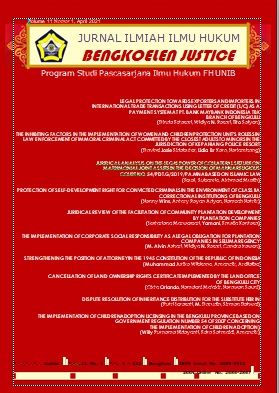Main Article Content
Abstract
The State and the Government are obliged and responsible for the orderliness of children adoption practices, both in terms of administration and legal certainty. Therefore several policies were issued through legislation and jurisprudence that regulates and handles the issue of children adoption. The implementation of children adoption must be based on Government Regulation of the Republic of Indonesia Number 54 of 2007 concerning Children Adoption. This study aims to get an overview and explanation of the Implementation of Licensing for ChildrenAdoption in Bengkulu Province Based on Government Regulation 54 of 2007 concerning the Implementation of Children Adoption. The children adoption process requires regulations that are in accordance with the Laws and Government Regulations and needs control of how they are implemented in the field. In addition to the Social Department of Bengkulu Province as the technical executor of adoption activities, it is necessary to establish a Regional Consultation Team for Children Adoption (known as PIPA in Indonesian abbreviation), to avoid irregularities in the process of implementation of children adoption, such as the adoption of children carried out without proper procedures, falsification of data and the existence of child trafficking, so the goal of adopting a child for the best interests of the child is not achieved. In analyzing the data in this thesis, the researcher applied a qualitative juridical analysis approach that describes the picture of the data obtained by researcher in the field and connects with each other to get a general conclusion. From the results of the qualitative juridical analysis, it can be seen and obtained inductive conclusions, namely the way of thinking in taking conclusions in general was based on facts that are specific. Data collection methods in this study were done through in-depth interview techniques, observation and documentation.The informants in this study were determined by selecting informants who comprehended and were directly involved in the implementation of child adoption programs. The informants consisted of the Head of Social Rehabilitation Division at the Social Department of Bengkulu Province, Head of Children and Elderly Social Rehabilitation Section at the Social Department of Bengkulu Province, Head of ChildrenProtection Section of the Women Empowerment Department and Children Protection in Bengkulu Province, Children Social Workers and Parents or Prospective Adoptive Parents who follow procedural for children adoption in accordance with applicable regulations. Data processing and analysis were conducted through data reduction, data presentation and conclusion drawing.
Keywords
Article Details
References
- Salim HS and Erlies Septiana Nurbani, Buku Kedua Penerapan Teori Hukum Pada Penelitian Disertasi dan Tesis, PT. Raja Grafindo Persada, Jakarta.
- Soerjono Soekanto, Pengantar Penelitian Hukum, Universitas Indonesia Press, Jakarta. 1986.
- Suratman and Philips Dillah, Metode Penelitian Hukum Dilengkapi Dengan Tata Cara dan Contoh Penulisan Karya Ilmiah Bidang Hukum, CV. Alfabeta, Bandung, 2014.
- Decision of Governor of Bengkulu Number IV.156.DINSOS of 2017 on Regional Consultation Team for Children Adoption of Bengkulu Province of 2017.
- Government Regulation of the Republic of Indonesia Number 54 of 2007 on the Implementation of Children Adoption
- Law of the Republic of Indonesia Number 23 of 2014 on Regional Government
References
Salim HS and Erlies Septiana Nurbani, Buku Kedua Penerapan Teori Hukum Pada Penelitian Disertasi dan Tesis, PT. Raja Grafindo Persada, Jakarta.
Soerjono Soekanto, Pengantar Penelitian Hukum, Universitas Indonesia Press, Jakarta. 1986.
Suratman and Philips Dillah, Metode Penelitian Hukum Dilengkapi Dengan Tata Cara dan Contoh Penulisan Karya Ilmiah Bidang Hukum, CV. Alfabeta, Bandung, 2014.
Decision of Governor of Bengkulu Number IV.156.DINSOS of 2017 on Regional Consultation Team for Children Adoption of Bengkulu Province of 2017.
Government Regulation of the Republic of Indonesia Number 54 of 2007 on the Implementation of Children Adoption
Law of the Republic of Indonesia Number 23 of 2014 on Regional Government

